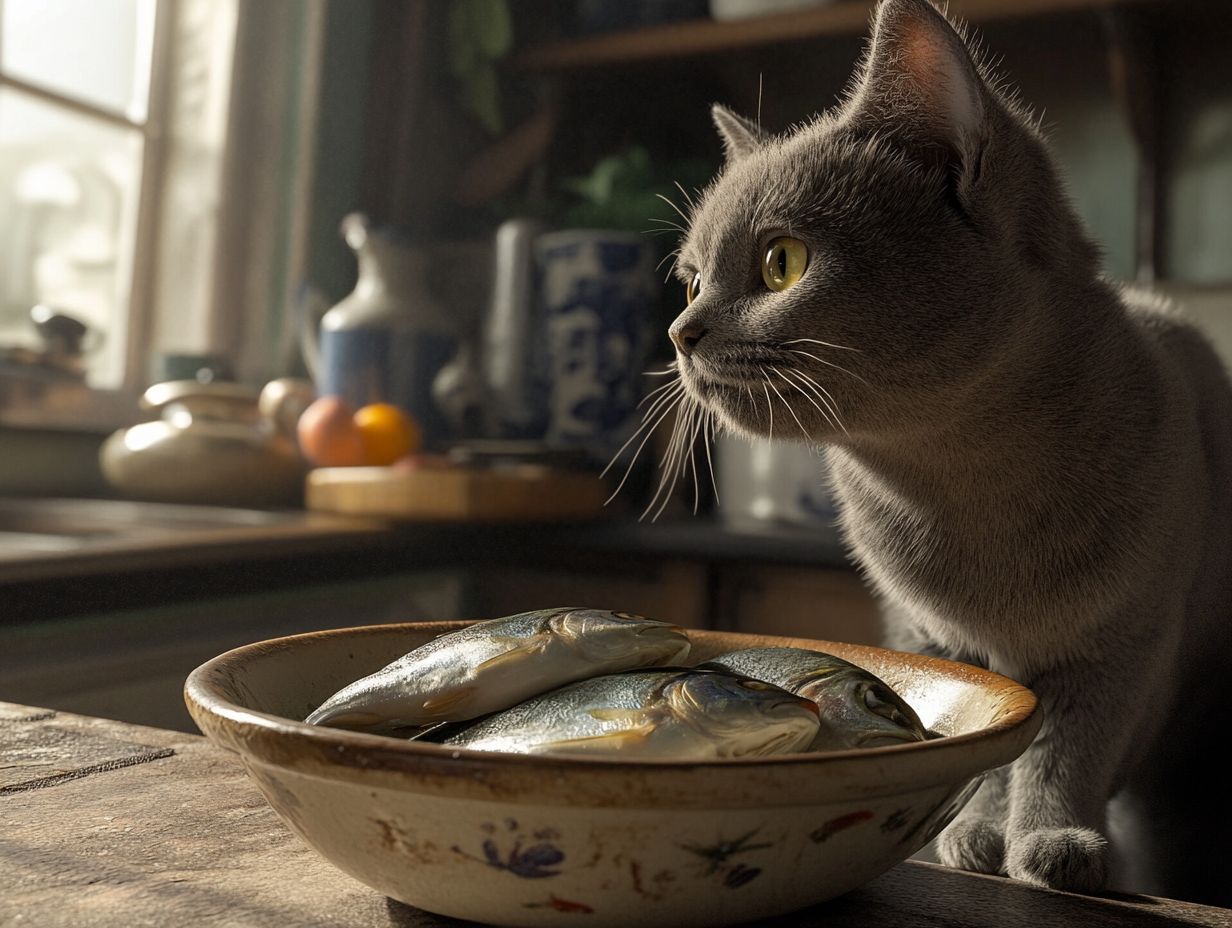Cats are often portrayed as seafood enthusiasts, but while fish can be part of a cat’s diet, it should not be a primary food source. A balanced diet from various protein sources is essential for your feline friend’s health.
This article explores the ins and outs of feeding fish to your cat. From the nutritional benefits, such as those found in fish oils, to potential health issues and allergies that can arise, it covers everything you need to know.
Additionally, safe options for incorporating fish into their diet will be highlighted, including wild haddock and Acadian redfish, along with alternative protein sources like chicken and turkey to ensure your cat enjoys a balanced meal.
Discover the best fish varieties for your furry companion that promote joint health and cognitive performance!
Key Takeaways:

- Feeding fish to cats can provide nutritional benefits such as essential omega-3 fatty acids and high-quality protein.
- However, it is important to be cautious, as fish can also pose potential risks for cats, including allergies and exposure to harmful substances like mercury.
- To safely incorporate fish into a cat’s diet, follow these guidelines:
- Stick to small amounts of cooked, boneless fish.
- Limit fish to 1 ounce for cats under 10 pounds.
- Avoid high-mercury options like tuna.
- Consider alternative protein sources, like a balanced raw diet, for a well-rounded diet.
Potential Risks of Feeding Fish to Cats
While fish can be a nutritious part of a cat’s diet, it’s important to understand both the benefits and potential risks involved in feeding it to your feline friend. Fish can be a healthy addition to a cat’s diet; however, there are potential risks associated with feeding fish to cats, including health issues related to overconsumption and allergies. It is crucial to read cat food labels carefully.
Carefully measure and balance the amount of fish in a fish-based diet to prevent problems linked to excessive fish intake, such as a lack of an important vitamin, which can be fatal for cats. Limit fish intake to a small serving, about 1-2 ounces, a few times a week.
Benefits of Feeding Fish to Cats
Feeding fish to cats offers numerous nutritional benefits, including a rich source of healthy omega-3 and omega-6 fatty acids, making it a healthy option. It serves as an excellent protein source and contributes to a balanced diet that promotes healthy skin, joint health, and cognitive performance in domestic cats.
Nutritional Value and Potential Health Benefits

Fish offers significant nutritional value for cats, providing essential omega-3 and omega-6 fatty acids that support their health. Varieties such as wild salmon, wild cod, mackerel, and sardines can enhance a cat’s diet, promoting a healthy immune system and overall vitality. These fish options are often recommended by reputable brands.
Wild salmon is particularly high in DHA, an omega-3 fatty acid that supports cognitive function and maintains healthy skin. Mackerel is rich in vitamin D, which is vital for calcium absorption and may help prevent calcium deficiency.
However, too much fish can lead to negative effects, including mercury poisoning and a lack of an important vitamin. Therefore, it is important to maintain a balanced perspective when incorporating fish into your cat’s diet.
Additionally, these fish are excellent sources of protein, promoting muscle development. Sardines contribute to bone health through their calcium content and provide thiamine, which reduces the risk of a lack of an important vitamin, essential for the healthy metabolism of carbohydrates, proteins, and lipids. Acadian redfish is another variety with similar benefits.
Can Cats Eat Fish?
Cats can enjoy fish, making it a popular treat among many domestic felines. However, cat owners must ensure that fish is incorporated into a balanced diet, as it offers nutritional benefits, including omega-3 and omega-6 fatty acids, which are good for skin and coat health, as well as a robust immune system. When considering fish-based diets, it’s vital to assess the nutritional powerhouse of each variety.
While fish can be a delightful addition to cat food, it is crucial to understand the guidelines for safe consumption to maintain the health of domestic cats. Consulting with a veterinary source can provide additional insights.
The Answer and Explanation
Yes, cats can eat fish, but only conditionally. Fish can be a beneficial source of protein, but it should be offered in moderation as part of a balanced diet. Veterinarians recommend including fish in a cat’s diet as an occasional treat rather than a routine component, ensuring all nutritional components are balanced.
The feline’s nutritional needs should primarily be met through a healthy mix of proteins, carbohydrates, and fats. This approach helps prevent potential health risks associated with mercury poisoning or thiamine deficiency that may arise from feeding fish too frequently.
Therefore, it is essential to follow feeding recommendations that emphasize the importance of variety in protein sources. When adding fish to their diet, cat owners should opt for options that are low in additives and cooked thoroughly. Fish oil supplements can also be beneficial, allowing their cats to enjoy the rich taste and nutrients without compromising their health.
Conclusion
In summary, while fish can be a tasty treat for your cat and offers several health benefits, it’s essential to incorporate it in moderation. Always consult with a veterinarian, ensure variety in protein sources, and prioritize a balanced diet to keep your feline companion healthy and happy.
Safe Options for Feeding Fish to Cats
By opting for safe types of fish, you can ensure that your cat receives the nutritional benefits of fish without exposure to harmful chemicals, ingredients, or processes. When selecting a fish-based diet for your cat, always read the labels of cat food products carefully to confirm that you are choosing safe options. It is also wise to consult a veterinary surgeon for guidance on reputable brands.
Types of Fish and Precautions to Take

The most common types of fish that can be safely given to cats include wild salmon, sardines, and mackerel, with each offering its own rich nutritional benefits.
To avoid mercury poisoning and nutrient imbalances, it is advisable to consult a veterinarian to ensure that fish are provided in the appropriate portions. Incorporating seafood dinners with caution can enhance variety in your cat’s diet.
Alternatives to Fish for Feeding Cats
There are several alternatives to fish for cats that can contribute to a balanced diet. Other protein sources, such as chicken, turkey, and beef, can be incorporated into your cat’s meals to ensure a well-rounded nutritional mix. Dog food is not suitable for cats due to different nutritional requirements. This approach also allows you to adhere to any special diets prescribed by a veterinarian.
Other Protein Sources and Balanced Diets
To ensure balanced nutrition, other protein sources such as poultry, beef, and eggs are incorporated into a cat’s fish-based diet. A balanced raw diet may also include fish treats that provide variety.
Chicken and turkey: These meats are rich in essential amino acids that cats need to maintain muscle health and support overall growth. Veterinary advice can guide appropriate incorporation of these proteins for optimal health.
Beef: This protein source provides high levels of iron, which is crucial for the formation of healthy red blood cells. It complements the nutritional components found in seafood.
Eggs: A high-quality source of protein, eggs also contain important vitamins and minerals that promote skin and coat health. Eggs can be part of special diets tailored to individual needs.
A varied combination of these protein sources contributes to a more complete nutrient profile, including vital components like taurine, which is essential for a cat’s heart and eye function. By focusing on dietary balance through diverse protein sources, you can help improve your cat’s overall health. Reputable brands offer options that adhere to these guidelines.
Frequently Asked Questions
Many cat owners wonder if fish is a safe and healthy food option for their feline friends. This article explores the benefits, risks, and guidelines for feeding fish to cats.
Can cats eat fish?

Yes, cats can eat fish, but it should not be a large portion of their diet. Ensure fish is safe and properly prepared for cats to consume.
What are the benefits of feeding fish to cats?
Fish can be a good source of protein and healthy fats for cats. It contains essential nutrients such as omega-3 fatty acids, which contribute to joint health and can help alleviate skin conditions. Research shows that omega-3 fatty acids can reduce inflammation and promote a shiny coat.
What types of fish are safe for cats to eat?
Some safe fish options for cats include cooked salmon, tilapia, sardines, and whitefish. However, avoid tuna due to potential mercury levels and other health risks, as well as raw fish and fish with small bones.
How should fish be prepared for cats to eat?
Cooked fish should be deboned and have all skin and excess fat removed before feeding it to cats. It’s important to avoid adding seasoning or spices, as they can be toxic to cats. A small serving of fish, such as a tablespoon of cooked salmon, once or twice a week, is sufficient.
Can too much fish be harmful to cats?
Yes, feeding too much fish to cats can lead to nutritional imbalances and health issues, including mercury toxicity. It is recommended to limit fish to no more than 10% of a cat’s daily diet, ensuring that their overall diet is balanced.
What are some alternative protein sources for cats?
If your cat cannot or does not enjoy eating fish, there are other protein options such as chicken, turkey, and beef. Chicken and turkey are lean sources of protein, while beef provides essential vitamins and minerals. Cooking methods like boiling or baking without seasoning are best. Always consult with a veterinarian before making significant changes to your cat’s diet.
Keep your vet informed about any dietary changes and consider getting personalized dietary advice based on your cat’s health.
In summary, in moderation, fish can be a healthy addition to your cat’s diet. Always prioritize safe preparation methods and consult your veterinarian for personalized advice.